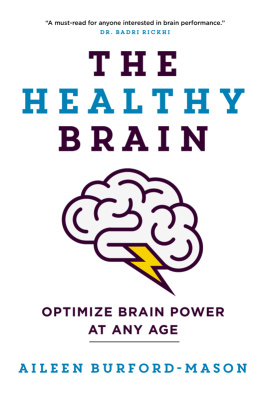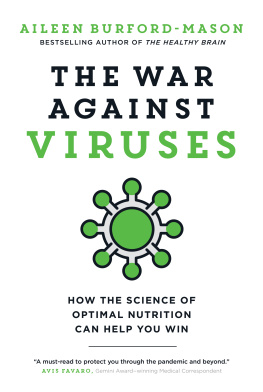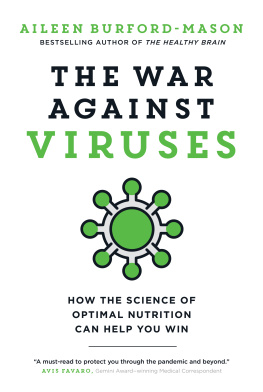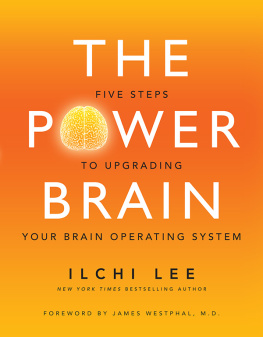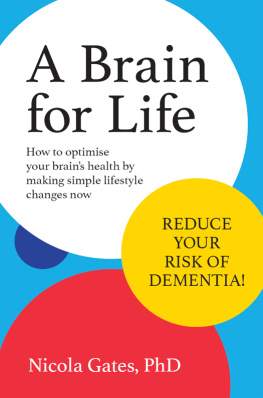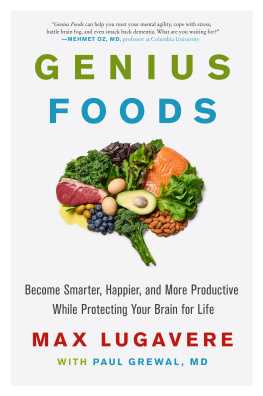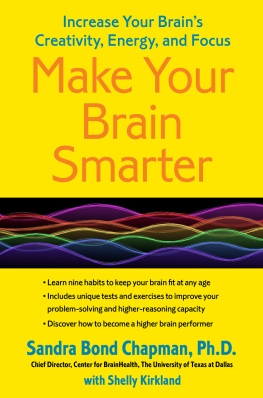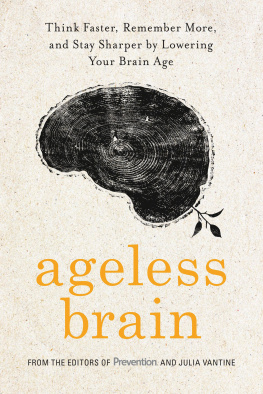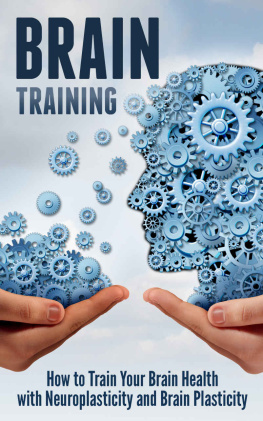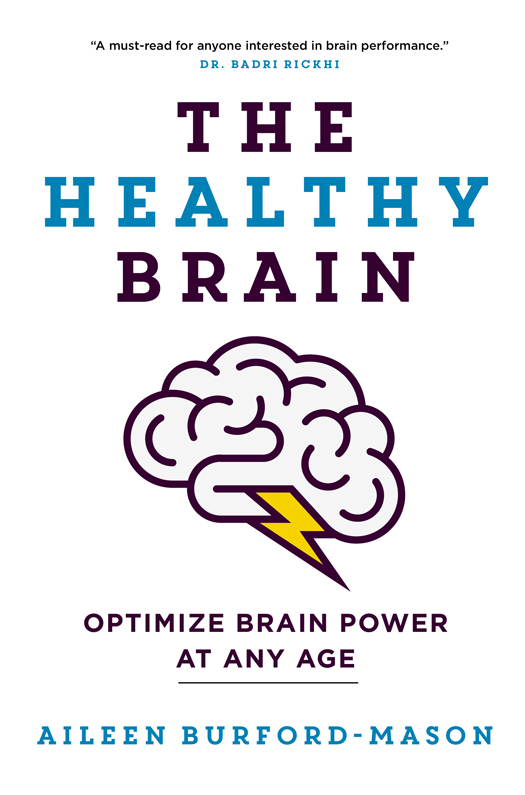In memory of my friend and mentor,
Dr. Ursula Martius Franklin
(19212016)


Figure. Illustration of a neuron
Figure modified from image May 27, 2016 OpenStax. Textbook content produced by OpenStax is licensed under a Creative Commons Attribution Licence 4.0 license. Download the original image for free at http://cnx.org/contents/73d8f8a746a34a3a-9afa-970f2f03deb3@4.
We are drowning in information, while starving for wisdom.
The world henceforth will be run by synthesizers, people able to
put together the right information at the right time, think critically
about it, and make important choices wisely.
E.O. WILSON, PhD,
Consilience: The Unity of Knowledge
Contents
Guide
If the human brain were so simple that we could understand it, we would be so simple that we couldnt.
EMERSON M. PUGH, in G.E. PUGH,
THE BIOLOGICAL ORIGIN OF HUMAN VALUES
These days its hard to open a newspaper or magazine without reading an article about the fragile state of our collective mental health. Autism is on the rise; teenagers are taking their own lives. Debilitating depression and anxiety are commonplace. Baby boomers face the frightening possibility of dementia not too far down the road. In Canada, one in five people will develop a mental health illness during their lifetime.
Other stories lament the deterioration of our food, and how inadequate diets are contributing to the huge burden of chronic disease our strained health-care budgets are coping with. But only the rare media story makes the link between deteriorating mental health and the food we eat. As the most metabolically active organ of the body, the brain has nutritional needs that are ten times higher than those of any other organ. So it may be the first organ to falter when nutrients are undersupplied. Some failures in brain chemistry are temporary and reversible. For example, we lose focus and concentration when we go too long without food and our blood sugar drops. This is an easy fix: just eat. But what the brain cannot withstand is the continuous underprovision of the nutrition it needsthe indispensable factors in food that keep it functioning.
According to the World Health Organization, dementia now affects 47.5 million people worldwide, and these numbers will skyrocket as populations age. However, scientists now admit that dementia is not an inevitable part of the aging process. Its a lifestyle disease, for which poor nutrition and lack of exercise are the major risk factors. Pharmaceutical approaches to treatment so far have been spectacular failures, which means our best option is taking steps to prevent the onset of dementia.
Current efforts to prevent dementia are aimed at those on the cusp of acquiring itthe middle-agedwho are urged to stop smoking, reduce alcohol intake, exercise daily and improve their diet. However, if we want our brains to last a lifetime, we need to start a lot earlier. In fact, as you will see in this book, much of our brain power is laid down in uterothe nine months before we are born. Like other diseases of aging, dementia may be a late-stage presentation of undernutrition at earlier life stages, with pregnancy a period of particular vulnerability.
While we can do nothing about the nourishment we received before we were born, with careful diet and appropriate supplements, any brain can be coaxed into improved performance. Regardless of our early nutritional history, there are many ways to enhance brain power at later stages of life. We can overcome the genetic impact of our nutritional heritage. Conversely, even the smartest brain will suffer when the nutrients it needs to function are regularly underconsumed. No matter how smart a brain we were born with, it will not last a lifetime without careful feeding.
Moreover, considering evidence that stress and intense intellectual or physical work also dramatically increase the need for many nutrients, we are all likely to suffer from dietary shortfalls from time to time. Many of us are pushing our brains to work hard while at the same time denying them the sustenance they need for efficient functioning. Think of the student, the ambitious executive, the athlete or the weekend warrior. Any of these individuals might be underperforming because they are short of protein, vitamin C or magnesium. As youll see from this book, both hard-working bodies and active brains can benefit from the use of nutritional supplements.
Just as a highway underpass that is not regularly inspected for maintenance and repair may begin to collapse, discharging dangerous chunks of concrete onto cars below, so we cannot assume that the brain will work well without proper maintenance and continuous attention to its food needs. It is the cumulative effect over many years of incorrect feeding that leads to the final collapse of the brain.
In the twenty-first century, medicine faces a dilemma. Although poor nutrition is driving waves of obesity, diabetes and heart disease, there is little emphasis on nutrition in medical training. On average, doctors in North American medical schools receive 19.6 hours of nutritional education. Blink and you miss it. Consequently, many doctors graduate with no more nutritional knowledge than a high school student. In the meantime, the whole field of nutritional research is exploding. The research literature is now so vast and complex that it has become an almost herculean task to fill the knowledge gap between those who keep abreast of developments in the field and those who do not.
But while their doctors are ignoring the role of nutrition in health, patients have been doing their homework, educating themselves on the Internet. Many are better informed on the latest research than their physicians. Often they find out by themselves that unexplained symptoms theyve been experiencing can be solved by fine-tuning their diets and adding nutritional supplements. Not surprisingly, such patients are frustrated when the role of nutrition is ignored in their treatment when research that is relevant to their care is either not known by their physicians or dismissed as irrelevant.
The professional training of dieticians is another problem, since it is currently rooted in the concept that theres no need to take extra vitamins as supplements. If we eat well, so the story goes, we will be healthy; if we follow official healthy eating guidelines, we will get all the essential nutrients we need. However, government statistics in Canada and the United States show widespread deficiencies of many key nutrients, even in those who consider themselves to be healthy eaters.
Since the earliest days of vitamin research, it has been clear that we differ from one another in the amount of each nutrient we need, often dramatically. To quote from the Heinz Handbook of Nutrition, published in 1959, In the light of contemporary genetic and physiologic knowledge the typical individual is more likely to be one who has average needs with respect to many essential nutrients but who also exhibits some nutritional requirements for a few essential nutrients which are far from average.
Is the idea that we each have our own unique needs for vitamins an outmoded concept? Is it okay to continue believing that the current officially sanctioned recommendations for vitamins (recommended daily allowances) fit all our needs? No. On the contrary, new sciences are emerging that show that, if anything, we have underestimated just how individual we are when it comes to nutritional requirements. A long roster of new scientific disciplinesnutrigenomics, metabolomics and many other -omicsis confirming what we have known for decades: there is no one-size-fits-all.

